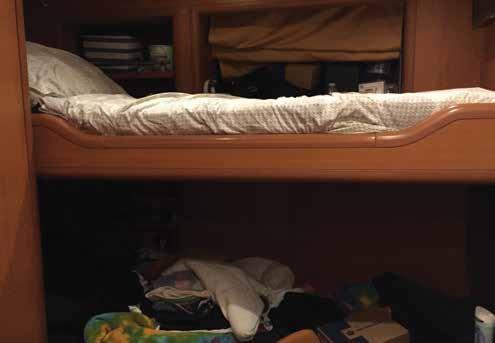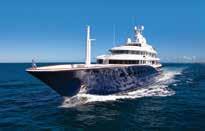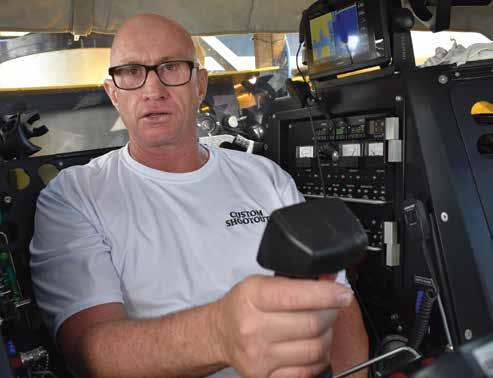
16 minute read
Everyone in yachting can protect crew wellness
CREW LIFE
How captains see mental health in yachting
By ISS Captains Committee
The Captain’s Committee of the International Superyacht Society (ISS) is a collective of current seafaring captains from varying backgrounds and locations that work together to represent the concerns of yacht crew and captains. Projects include support for ISWAN and the launch of the yacht crew helpline yachtcrewhelp.org and the publishing of issues of wide industry concern.
In this second article from the ISS Captains [find the first one about fatigue at the-triton.com], we confront an issue that cannot be ignored. It is not generational, not gender specific nor culturally targeted. Mental health of seafarers poses a threat and risk to all crew. It manifests in seemingly innocuous behavioral changes and can have devastating consequences.
This article was in draft well before COVID-19 changed the fabric of our global community. We will not provide any commentary on the crisis as there is enough already. All it does is heighten the need to be aware of our seafarers and their mental health challenges.
The problem
Crewing on a yacht is characterized by a unique set of features that sets it apart from other occupations. This includes: 1. Living in an environment that must appear to be “perfect” at all times, 2. A lack of empathy from shore support network (i.e. misdirected envy from family and friends with no understanding of yachting environment or pressures), 3. Demanding physical and mental working conditions, 4. Long hours of work creating high levels of stress and fatigue, and 5. Employment insecurity where the slightest perceived failure can result in being let go on a whim with all the attendant stress.
It can also be a lonely life. Not only are yacht crew away from family and friends for long periods of time – for some at a young age – many seafarers live isolated lives while onboard. An increasing degree of automation onboard ships has led to smaller crews, and crew members may have different cultural and ethnic backgrounds. Of course, cultural diversity is also a positive, depending on how it is approached.
The lonely life in seafaring is not new, of course. What is new is that society’s expectations have moved incredibly quickly. This cannot be ascribed to any generation; in a time of constant connectivity, nobody expects to be out of contact for an extended [time] from loved ones, family and friends ashore.
Technology, for all its wonders, can also not be ignored. It has become clear that the use of technology, especially social media, has made the individual more isolated, with face-to-face interactions diminished.
Crew are goaded into presenting an alternative reality online. This “reality” often presents a life that is carefully curated and full of joy, whereas the lived experience of the crew member is long working hours, little recognition and restricted living quarters, all the while traveling to beautiful locations but being unable to step ashore to enjoy them. This may be the true reality, though the picture shown on social media by the crew member is very different, all smiles, and beach parties.
The incongruence and tension between these two realities creates tremendous stress on the individual. It can have a devastating impact and was cited as a contributing factor to the loss of a member of our yachting community who could not reconcile the online reality with the yacht’s true reality.
As we captains did in our first article, we also look to other industry sectors for guidance to define and understand the problem.
The commercial marine sector is aware and concerned for seafarers’ mental health, so much so that Cardiff
Captains discuss mental health, raise money for online support
Small crew cabins are the only private space a crew member has onboard, and it is often shared. TRITON FILE PHOTO

University was supported to conduct a study into cause and effect (published Gard Nov. 26, 2019).
In the commercial sector, 55% of companies had not introduced policies or practices to address seafarers’ mental health. The ISS captains read this as 45% positively responded. It would be frightening to conduct the survey in the yachting sphere.
“The study concludes that ‘it is appropriate for industry stakeholders to be concerned about seafarers’ mental health and wellbeing and that such worries may be somewhat overdue. In fact, 55% of employer respondents stated that their companies had not introduced any policies or practices aimed at addressing issues of seafarers’ mental health in the last 10 years. Going forward, there needs to be much more emphasis placed on proactive measures aimed at improving the conditions of work and life onboard for seafarers and less placed on reactive and self-help strategies for employers and seafarers.”
Shortcomings
The captains in their shared and lived experience do not know of a cohesive policy that recognizes or provides support strategies for crew experiencing mental health problems. With many yacht medical policies excluding cover for mental health or stress injury, it is almost structurally denied as being a medical issue.
With this being so, the seafarer must make the decision whether to stay and try to “work through it” or lose their income. Would we do the same with a broken limb?
MLC [the Maritime Labour Convention] requires there to be a policy on bullying and harassment, but how is this supported beyond a document?
We are a long way from a solution when an ISS captain reports:
“… On the last trip, my owner said that psychology has nothing to do with
By Lucy Chabot Reed
More than 80 yacht captains and industry professionals gathered in a webinar during “An Hour with Colin Squire” on May 6 to discuss mental health issues among yacht crew and ended up raising enough money to create a yacht-specific portal to provide online access to free mental health information and support, www.yachtcrewhelp.org.
That portal will offer 24/7 live support in multiple languages through various modes including computer and phone to help yacht crew navigating the stresses and pressures of yachting, to help families of crew dealing with issues, to help captains deal with emergencies or handle mental health issues, and provide wellness tools for all crew.
The site mirrors another that ISWAN (International Seafarers Welfare Assistance Network) has created for commercial seafarers.
“We exist to promote the welfare of seafarers worldwide,” said Caitlin Vaughan of ISWAN. “MHG came to us a couple years ago and asked us to do research to see how we might provide this same help to yacht crew. … One of the biggest surprises was learning that crew didn’t know where to go when they needed support. So what can we do first? Provide access to support.”
But after conducting a survey, it was clear yacht crew would not use the commercial site, which set ISWAN and several industry players to task raising the money needed to create a yachting-specific site.
“For better or worse, we are a unique culture in yachting,” said Capt. Brendan O’Shannassy, moderator and host of the webinar.
Capt. Mike Mclean of S/Y Andromeda has gone through a few “critical incidents” during his time in yachting, and noted that the lack of training in how to handle mental health issues and in support when they happen made the situations (everything from substance use and abuse to suicide) harder than they had to be.
“Where do you go for support when you are the rock people lean against?” he said. “The lesson I’ve learned is we create the environment in which we live and work for the crew. It’s quite frustrating when something happens and you don’t have a clear avenue for support.
“We need to navigate the sense of loss, the depression, the whole scale of issues,” he said. “The size of the [audience today] for this conversation shows it’s a real issue people are dealing with.” He noted that he’s got a strong network of professional colleagues to call upon, but said that doesn’t usually exist for junior crew.
“Another thing to navigate in a critical situation is how various players play their role and how to communicate that to junior crew,” he said, especially flag state, the DPA, and the owner.
“It’s hard to understand everyone’s perspectives at times. Everyone is dealing in their own way at their own pace. We’ve got to communicate that to crew.
“How you do it is by making it an everyday topic,” he said, quoting Rumi: “Yesterday, I was clever so I wanted to change the world. Today, I am wise so I am changing myself.”
“We create that in how we communicate with each other, how we interact with each other, and how we resolve conflict.”
So yachting is trying to implement
See WEBINAR, Page 37
FIRST LOOK
Herbert “Herb” Magney Oceans Master Sail and power
Teamwork makes the dream work.
Pick me to be on your team. I can assist and advise on:
• Vessel operations • Compliance assistance • Charter development • Small Business development • Public relations • Crew development • Logistics onboard and ashore
Sometimes just the act of getting in touch with another professional will help guide your growth and movement at any time.
954.309.3958
CaptHerbMagney@yahoo.com
leading a bunch of yacht crew in tight quarters. It made me laugh because it is actually the biggest and most important part of my job.”
The senior captains of the ISS understand their roles and the responsibility given to them, and contrary to some this is not for manoeuvring the wonderful yachts. It is for delivering consistent leadership and effectively communicating.
The power of leadership (an ISS captain’s story)
After taking command of a large yacht from another captain, it was apparent one of the deck department was drinking too much, overweight, and quick to anger. Looking to find a cause over just dealing with the problem, I discovered the past captain would scream, yell and micromanage. With this known, it was a conscious shift to show the deck crew kindness, leadership, and encouragement to take ownership of their department.
The team completed more in less time, and the beat-down crew member started training, drank less, lost weight, and told his fellow crew that he was happier with his job and now wanted to stay.
I can teach my young nephew how to correctly dock a boat or fill out paperwork, but it is only through our education and lived experience that we develop into the leaders that can psychologically help a crew member in need, whether it is a professional or personal issue. We are all without our loved ones at sea and crew rely on the captain and department heads to have developed emotional skill sets to support them.
Never underestimate how much influence you can have on some people with positive interaction over time.
The solution(s)
As with every article the ISS captains present, we acknowledge, simple solutions would be in place and there is no single “silver bullet”. Nevertheless, we say there is a way to go in the yachting community and some of the changes are not beyond taking steps toward today.
Yachting is a wonderful community and profession to be involved in. It presents great opportunities for personal growth, education, life experiences, and friendships. It broadens most people’s horizons through travel and contact with different cultures, both through journeys and also via co-workers.
These are opportunities that should be cherished and taken advantage of. Additionally, in challenging economic times, yacht crew can gain an advantage with their at-sea salary helping them gain a financial foothold not available to many of their shore-based peers.
As captains, it is our moral responsibility to make sure that these opportunities are taken by crew. This support and constant communication can help having a crew that is stimulated and has tolerable levels of stress. Remember captains: “lead the people, manage the process”.
Captains.
Leaders are not born, nor are they created with a certificate of maritime competency. Captains need experience to lead and to acknowledge they do not have all the answers.
Mentoring/coaching is common in the corporate and military spheres. It is beginning to be available in yachting. Captains, owners and managers of yachts are encouraged to seek this. The ISS can provide referrals for mentoring services.
Crew.
Captains all try their best with the tools they have at their disposal. They make errors, and some (regardless of certificate) are just not suited to lead a team and can, through their own sense of self-preservation, be incredibly damaging.
Crew must speak up using their respective pathways (DPA/owner’s representative) if this is the case. It is a serious step but one that, at times, is essential.
Structure of operations.
There must be systems in place to handle stressed crew, but again ask if the stress is actually a symptom of the real problem that never gets acknowledged.
This could be one or more things such as a guest-on schedule that does not acknowledge the humanity of those delivering it, one person with power in the organization that has no leadership skills and does more damage than good, or someone who is far more interested in job self-preservation than helping the team to solve the issues that are crippling the organization. The challenge to a yacht is to identify and rectify this structural flaw.
Three Cs: Communication, Communication, Communication.
Having the old-fashioned ownercaptain relationship can go a long way to helping with crew morale and their mental health. All ISS captains wish every owner asked the open-ended question of what suggestions the captain has in regard to solving the problem of crew. A prepared captain can discuss how the past few years of the guest usage schedule has been a benefit or a detriment.
To help build the team of people from all over the world, confirm that you are having the appropriate number of quick and to-the-point meetings, as most crew complain of the “mushroom” scenario.
From little things, big things grow
There are many small changes that, when aligned, can make a difference. Use of recreational areas and the gym when guests are not onboard helps immensely as does having the time in the program to actually provide clear unencumbered days off to crew.
The captain needs to feel supported by their management and yacht owner to think as far outside the box with creative ideas that are minimal impact for the owner, but a great benefit to the crew.
Also, while crew are eating lunch or dinner, ask them to not be looking at their phones, but instead engage with the other people at the table and turn off the TV at mealtimes and breaks.
These steps will not solve anything quickly, but over months and months, you will see a difference in how the team comes together. By only looking at our phones, I would never know that one of my fellow crew has a brother with the same physical handicap my cousin has. Talking about it makes us much closer.
Summary
The awareness of mental health is critical in all aspects of our community living, professionally and personally. One ISS captain observed that “mental health concerns are so prevalent I am dealing with them daily. This should not be the case; something needs to change.”
If we were to do a stress/mental health risk analysis as we may do for other hazardous operations, would our yachting work environments pass? If they wouldn’t, what do we need to change?
For the love of yachting, the ISS captains ask that we all become stakeholders in supporting our captains and crew in this most critical aspect of their safety and performance. We also ask that you do more than nod in acknowledgement. We ask that you join us in supporting ISWAN and donate to the development of their support portal (www.justgiving.com/campaign/ yachtcrewhelp). Now more than ever this is needed.
The International Superyacht Society (ISS) is the representative organization of the large yacht industry with a mission to “promote excellence and ensure sustainability in the global yachting industry”. The Captains Committee is a committee of eight yacht captains; info@ superyachtsociety.org.
the same sort of Employee Assistance Programs (EAPs) that the corporate world has offered its employees for decades.
“Whatever more than 50% of an industry would have done becomes the norm, and that develops over time,” said Tony Nicholson, directory of the luxury yacht/new builds division of MedAire, a rglobal emote medical and security company based in Arizona.
“It’s unusual now for corporations not to have an EAP, particularly if they have employees traveling overseas,” he said. “It leads to a happier workforce, less absenteeism, and more productivity.”
“We are far behind most corporations that run businesses to the caliber we are doing,” said Capt. Rafael Cervantes Mataix, noting that hiring practices should include things such as psychometric testing. “It’s relatively easy to instigate, low cost, and has a high yield. The more you hire people, the more savvy you access to support. It’s an investment get, but you have limited tools.” in crew.”
He also noted that in the past Fort Lauderdale-based MHG few years, he’s used drug testing to Insurance company was “on ground isolate behavioral issues before they zero on this”, Capt. O’Shanassy turned into “critical incidents”. said, noting the company has been
“For many years, I never did unless working to get crew health policies I had reason to,” he said of drug to include mental health support. testing. “In the last few years, I had Yesterday, I was “When crew are able to reach abuse that I never in clever so I wanted to support, it prevents a million years would change the world. what potentially can have seen coming. That might point to problems in mental Today, I am wise so I am changing be a worse medical scenario,” said Mark Bononi of MHG. health. Something is myself. “By providing this pushing crew to self – Rumi, a 13th-century benefit, insurers can medicate. There’s a Persian poet improve the success line here. Maybe this of coverage overall.” person shouldn’t be The webinar in this environment [on yachts]. It was organized by the Captain’s will be detrimental to him/her.” Committee of the International
Capt. O’Shannassy agreed. Superyacht Society. A question-
“That investment in the start and-answer session extended the to help crew understand the discussion another hour after the environment is valuable,” he said. five panelists spoke. “Substance abuse is not the cause; The next day, Squire released it’s the result, hence the need for this statement: “It is with pride and pleasure that I am able to announce that following the live donations during the call and pledges made, the www.yachtcrewhelp.org site has funding to be established and pathways for continuing funding are also known. The ability to donate remains open via the JustGiving page that can be reached via www. yachtcrewhelp.org.”
The portal was expected to be live by mid-summer but COVID has impacted progress and it had still not been activated by mid-September.
“The vision is to have a sticker with a QR code to the portal on the back of every cabin door in every yacht,” ISS stated in a press release about the webinar. “It is completely independent of managers and employers, and training providers could also hand the stickers to STCW graduates. It is non-commercial / non-branded and for all crew.”
Lucy Chabot Reed is editor/publisher of The Triton. Comments are welcome at lucy@the-triton.com.
OIL

HYDRAULIC FLUID
FUEL
FIRE WATER MIST

DEBRIS & FILTER WORLD-CLASS SUPERYACHTS DESERVE WORLD-CLASS LABORATORY ANALYSIS
For over 44 years, Spectro | Jet Care has looked after the oil, hydraulic and fuel analysis for thousands of superyachts. World-class laboratories accredited to the highest international standards ensure you stay ahead of maintenance and systems issues, and the crew and guests are safeguarded from machinery failure. Experience our experience. There’s none better. Period.

thetriton@spectro-oil.com thetriton@spectrthetriton@jet-care.com o-oil.com










